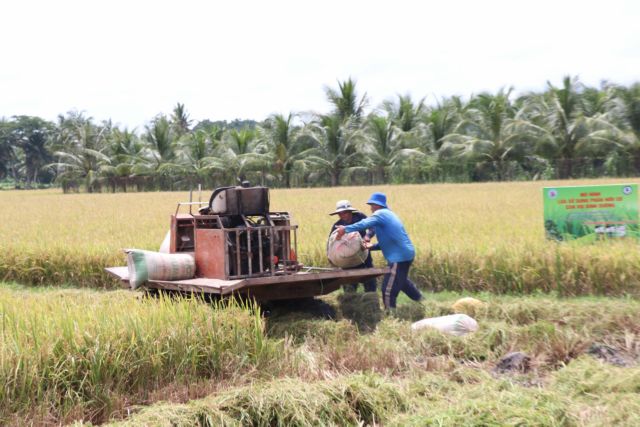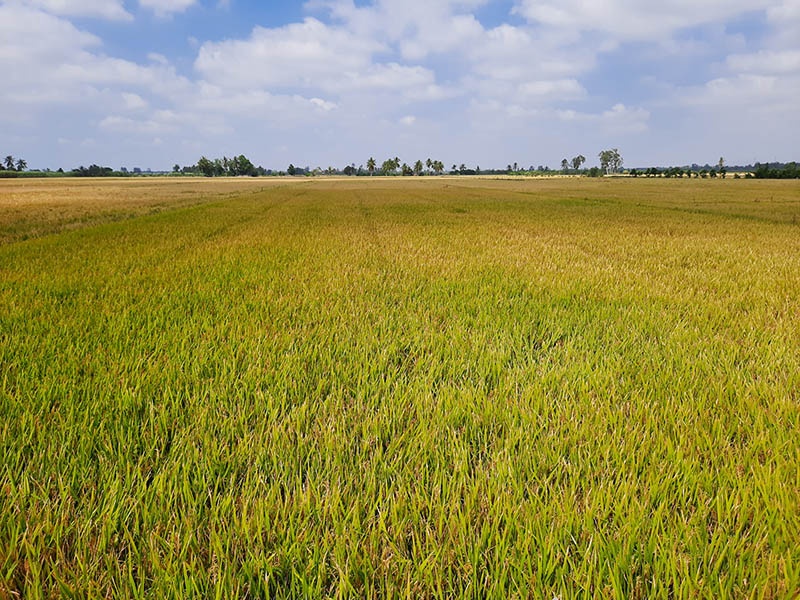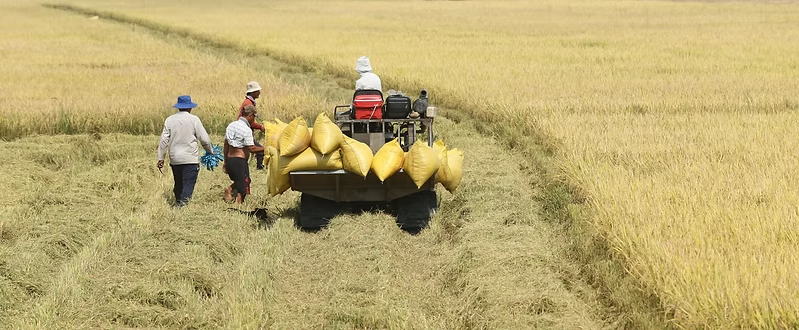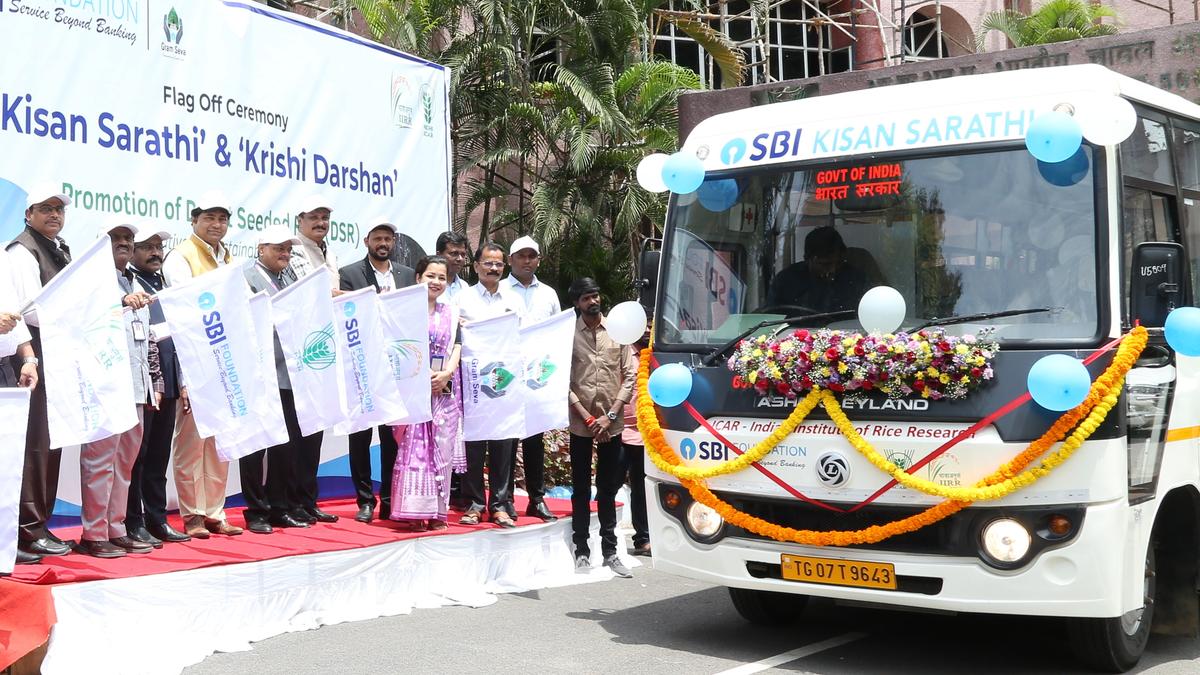Tags
Experts discuss low-emissions rice project
Experts have gathered in a seminar held on August 26 by the Ministry of Agriculture and Rural Development focusing on advancing sustainable development and green growth in the Mekong Delta region through a significant rice cultivation project.

HÀ NỘI – Experts gathered in a seminar held on August 26 by the Ministry of Agriculture and Rural Development (MARD) to discuss advancing sustainable development and green growth in the Mekong Delta region through a significant rice cultivation project.
The initiative aims to enhance rice production while minimising emissions, with a goal of developing one million hectares of high-quality rice fields by 2030.
At the seminar, Nguyễn Đỗ Anh Tuấn, Director of the Department of International Cooperation at MARD, said that the project has been piloted over three consecutive rice production seasons in several key provinces: Cần Thơ, Trà Vinh, Sóc Trăng, Kiên Giang and Đồng Tháp. This pilot phase has provided valuable insights and data, which will guide the broader implementation of the project.
The seminar brought together experts and representatives from 12 provinces and cities in the Mekong Delta, emphasising collaborative efforts to refine strategies and achieve the project’s ambitious goals.
The 50-hectare model implemented at Tiến Thuận Cooperative in Vĩnh Thanh District, Cần Thơ City, has demonstrated significant improvements in rice cultivation practices. Key outcomes include reducing the amount of rice seeds used from 140kg to 60kg per hectare, fertilisers now being applied only twice per crop instead of 3-4 times, and reducing the usage of inorganic fertiliser by at least 20 per cent. This approach has also led to fewer instances of rice plants falling as well as reduced disease rates.
At the seminar, Hà Thị Nga, Chairwoman of the Vietnam Women’s Union and a Member of the National Assembly Delegation from Đồng Tháp Province, emphasised the significance of the rice cultivation project. She highlighted that the project aims to shift rice production in the Mekong Delta from fragmented, small-scale operations to large, concentrated areas, fostering more synchronised development across the region. Nga noted that successful implementation will enhance the rice value chain by incorporating agricultural by-products, which can add value and reduce waste. She stressed that by adopting more sustainable practices, the project helps lower emissions associated with rice cultivation and farmers could earn additional income through carbon credits if emissions reductions are effectively realised. This extra income can support improved livelihoods for farmers.
Nga further noted that the project holds promise for several benefits beyond just improved rice cultivation. The project is anticipated to boost income for farmers, providing them with more economic stability and opportunities. By creating more appealing and sustainable agricultural practices, the project may encourage young people to return to and engage in agricultural production in their local areas.
However, she noted that achieving these outcomes will require significant political will and commitment from various stakeholders. This includes MARD, leaders from the 12 provinces, cities, cooperatives and farmers themselves.
The transition from traditional farming methods to new, sustainable practices is identified as a major challenge, as many farmers are accustomed to conventional techniques.
Thạch Phước Bình, Deputy Head of the National Assembly Delegation from Trà Vinh Province, expressed his concerns about the current state of infrastructure development. He pointed out that there are issues with the planning and development of essential infrastructure such as irrigation systems, transportation networks and storage facilities. Bình noted that the infrastructure is not yet well integrated or fully connected, which could hinder the effective implementation of the project.
Addressing these concerns will be crucial for the successful realisation of the project’s goals and for supporting the broader development of the Mekong Delta’s rice sector.
Minister of Agriculture and Rural Development Lê Minh Hoan highlighted the critical challenges faced by the Mekong Delta region due to climate change and outlined the strategic importance of the one-million-hectare high-quality rice project.
For decades, the Mekong Delta’s rice industry has suffered from fragmentation and a lack of connectivity. This has been driven by small-scale, seasonal thinking among farmers. The project is designed to address these issues by promoting a more unified and strategic approach.
If successful, the project in the Mekong Delta could serve as a model for similar initiatives in other regions and industries, such as livestock and aquaculture.
Minister Hoan stressed that farmers are central to the success of the project, noting that without changes in farmer behaviour and practices, the project’s goals cannot be achieved. The project aims to fundamentally transform and reorganise the rice industry into a more sustainable model.
MARD, along with the Ministry of Industry and Trade, has recommended that the Government incorporate ‘traders’ into the rice industry system. A sustainable rice industry requires a comprehensive ecosystem involving farmers, traders, businesses and state institutions.
Minister Hoan urged local leaders to view this project as a “revolution” in order to achieve success. The involvement of all stakeholders is crucial for the project’s success and for fostering a sustainable and resilient rice industry. — VNS
https://vietnamnews.vn/economy/1661947/experts-discuss-low-emissions-rice-project.htmlPublished Date: August 28, 2024






